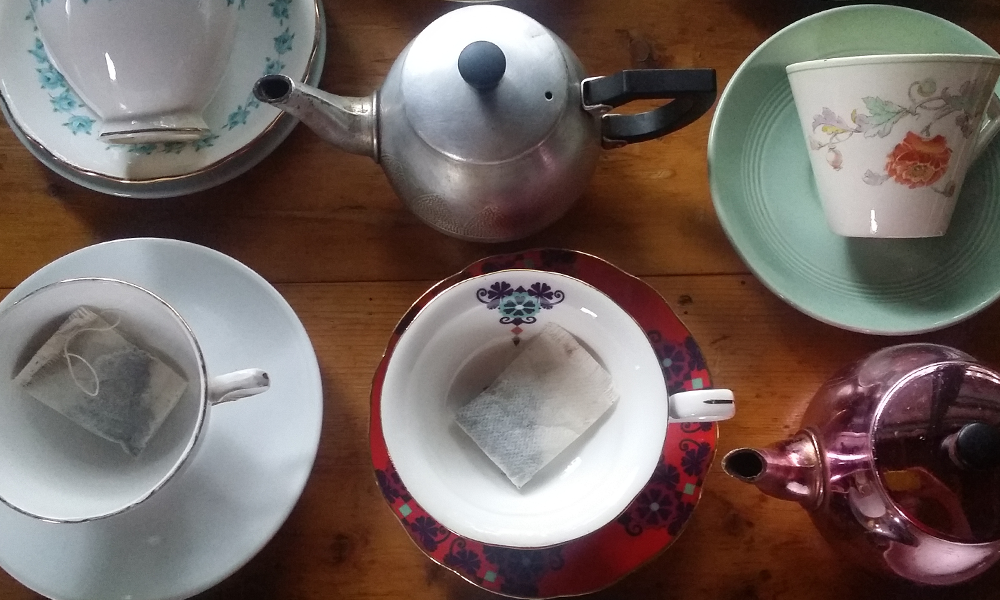For many, a cuppa brewed with a tea bag is part of their daily ritual and in many countries the teabag reigns supreme.
The first use of the teabag dates back to over 100 years ago, when a New York tea merchant sent out samples of tea packed into silk bags. People assumed that the bags were to be used in the same way as metal infusers, and placed the entire bag into the pot to brew the tea. It was then that the convenience of the teabag was born.
The old tea bags were all made from natural fibres and could completely biodegrade but now in our world of fast paced convenience - many are made and sealed with plastic. So how do we know which tea bags can go in the compost and which should go to landfill? The answer is unfortunately not as simple as you might think.
It seems each tea company has a different kind of tea bag paper. Some are made from a blend of manilla hemp, cellulose and thermoplastic fibres, some companies refer to the plastic element in their bags as synthetic fibres and some companies proudly state their bags are made from abacá plant with no plastic in them at all.
We recommend compostable bags without plastic fibres so we've done a bit of research to find out which popular brands contain plastic and which don't!
These tea bags do not contain plastic:
- Lipton Quality Black and Intense (traditional tea bags) are made from Manilla hemp and cellulose fibres. They are compostable but not recyclable.
- T2's new teabags, which recently changed due to customer demand (yay!), are now made from cornstarch and are biodegradable
- Pukka's teabags are folded and stitched together with organic cotton. They're plastic free and can go straight into your compost!
- Tielka tea bags have zero plastic content and the fabric is made from corn fibre.
These tea bags do contain plastic:
- Lipton Green Decaf, Chai and Herbal (traditional tea bags) are made from Manilla hemp, cellulose and thermoplastic fibres. They are not compostable or recyclable.
- Bushells Tea Bag paper is made from Manila hemp, cellulose and thermoplastic fibres, as such they are not compostable or recyclable.
- Nerada tea filter paper is manufactured using a blend of high-quality manila hemp, which does contain a tiny percentage (less than 2%) of food-grade synthetic fibres. These fibres are used to heat-seal the teabag, ensuring that the tea remains inside the bag while brewing.
- Nerada are currently in the process of trialling a new filter paper made from 100% natural fibres and plan to introduce it into their tea bags as soon as soon as the trial results are successful.
- Madura tea bag filter paper is comprised of 80% natural materials, with the balance being made up of synthetic fibres.
- Tetley claim they continually seek to work with their suppliers to improve and explore the most sustainable production processes and methods. However, as a result of the manufacturing process, Tetley tea bags do contain a very small amount of plastic to ensure the bags remain closed when they are in your tea.
- Twinings use a plastic based material (acrylic polymer binder) to bind the materials together to create the paper for their teabags.

Try a reusable tea bag
If you're wanting to go zero waste and still use a tea bag, you can try out a reusable one!
These 'Tea Swags' are all natural and reusable. You just fill them up with loose leaf tea or herbs from your garden, steep it in hot water as you would a normal teabag, then when you're done, empty the contents into the compost, rinse the tea swag and hang it out to dry!
The other option is to switch to loose leaf tea!
The one thing all the tea companies do seem to agree on is that loose leaf tea in a teapot makes a superior tasting tea. Nerada loose leaf black tea comes in a simple, plastic free, cardboard box and can be found at most major supermarkets (often on the bottom shelf). Mayde Tea is an organic tea brand based in Byron who package their teas in a fully compostable cardboard and paper bags or glass jars.
So whether you're a teabag lover or a loose leaf die hard, do your best to find plastic free options if you can. and if your favourite brand is still using plastic, let them know you'd love them to change their ways!
Have we left your fav plastic free tea brand off the list? Let us know and we can add it in!

